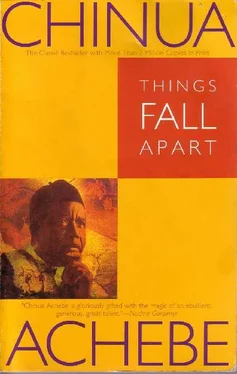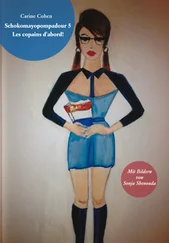Chinua Achebe - Things Fall Apart
Здесь есть возможность читать онлайн «Chinua Achebe - Things Fall Apart» весь текст электронной книги совершенно бесплатно (целиком полную версию без сокращений). В некоторых случаях можно слушать аудио, скачать через торрент в формате fb2 и присутствует краткое содержание. Город: New York, Год выпуска: 1994, Издательство: A DIVISION OF RANDOM HOUSE, INC., Жанр: Контркультура, на английском языке. Описание произведения, (предисловие) а так же отзывы посетителей доступны на портале библиотеки ЛибКат.
- Название:Things Fall Apart
- Автор:
- Издательство:A DIVISION OF RANDOM HOUSE, INC.
- Жанр:
- Год:1994
- Город:New York
- ISBN:нет данных
- Рейтинг книги:2 / 5. Голосов: 2
-
Избранное:Добавить в избранное
- Отзывы:
-
Ваша оценка:
- 40
- 1
- 2
- 3
- 4
- 5
Things Fall Apart: краткое содержание, описание и аннотация
Предлагаем к чтению аннотацию, описание, краткое содержание или предисловие (зависит от того, что написал сам автор книги «Things Fall Apart»). Если вы не нашли необходимую информацию о книге — напишите в комментариях, мы постараемся отыскать её.
—W. B. Yeats, "The Second Coming"
Things Fall Apart — читать онлайн бесплатно полную книгу (весь текст) целиком
Ниже представлен текст книги, разбитый по страницам. Система сохранения места последней прочитанной страницы, позволяет с удобством читать онлайн бесплатно книгу «Things Fall Apart», без необходимости каждый раз заново искать на чём Вы остановились. Поставьте закладку, и сможете в любой момент перейти на страницу, на которой закончили чтение.
Интервал:
Закладка:
Ekwefi went into her hut to cook yams. Her husband had brought out more yams than usual because the medicine man had to be fed. Ezinma went with her and helped in preparing the vegetables.
"There is too much green vegetable," she said.
"Don't you see the pot is full of yams?" Ekwefi asked. "And you know how leaves become smaller after cooking."
"Yes," said Ezinma, "that was why the snake-lizard killed his mother."
"Very true," said Ekwefi.
"He gave his mother seven baskets of vegetables to cook and in the end there were only three. And so he killed her," said Ezinma.
"That is not the end of the story."
"Oho," said Ezinma. "I remember now. He brought an other seven baskets and cooked them himself. And there were again only three. So he killed himself too."
Outside the obi Okagbue and Okonkwo were digging the pit to find where Ezinma had buried her iyi-uwa . Neighbors sat around, watching. The pit was now so deep that they no longer saw the digger. They only saw the red earth he threw up mounting higher and higher. Okonkwo's son, Nwoye, stood near the edge of the pit because he wanted to take in all that happened.
Okagbue had again taken over the digging from Okonkwo. He worked, as usual, in silence. The neighbors and Okonkwo's wives were now talking. The children had lost interest and were playing.
Suddenly Okagbue sprang to the surface with the agility of a leopard.
"It is very near now," he said. "I have felt it."
There was immediate excitement and those who were sitting jumped to their feet.
"Call your wife and child," he said to Okonkwo. But Ekwefi and Ezinma had heard the noise and run out to see what it was.
Okagbue went back into the pit, which was now surrounded by spectators. After a few more hoe-fuls of earth he struck the iyi-uwa . He raised it carefully with the hoe and threw it to the surface. Some women ran away in fear when it was thrown. But they soon returned and everyone was gazing at the rag from a reasonable distance. Okagbue emerged and without saying a word or even looking at the spectators he went to his goatskin bag, took out two leaves and began to chew them. When he had swallowed them, he took up the rag with his left hand and began to untie it. And then the smooth, shiny pebble fell out. He picked it up.
"Is this yours?" he asked Ezinma.
"Yes," she replied. All the women shouted with joy because Ekwefi's troubles were at last ended.
All this had happened more than a year ago and Ezinma had not been ill since. And then suddenly she had begun to shiver in the night. Ekwefi brought her to the fireplace, spread her mat on the floor and built a fire. But she had got worse and worse. As she knelt by her, feeling with her palm the wet, burning forehead, she prayed a thousand times. Although her husband's wives were saying that it was nothing more than iba , she did not hear them.
Okonkwo returned from the bush carrying on his left shoulder a large bundle of grasses and leaves, roots and barks of medicinal trees and shrubs. He went into Ekwefi's hut, put down his load and sat down.
"Get me a pot," he said, "and leave the child alone."
Ekwefi went to bring the pot and Okonkwo selected the best from his bundle, in their due proportions, and cut them up. He put them in the pot and Ekwefi poured in some water.
"Is that enough?" she asked when she had poured in about half of the water in the bowl.
"A little more… I said a little . Are you deaf?" Okonkwo roared at her.
She set the pot on the fire and Okonkwo took up his machete to return to his obi .
"You must watch the pot carefully," he said as he went, "and don't allow it to boil over. If it does its power will be gone." He went away to his hut and Ekwefi began to tend the medicine pot almost as if it was itself a sick child. Her eyes went constantly from Ezinma to the boiling pot and back to Ezinma.
Okonkwo returned when he felt the medicine had cooked long anough. He looked it over and said it was done.
"Bring me a low stool for Ezinma," he said, "and a thick mat."
He took down the pot from the fire and placed it in front of the stool. He then roused Ezinma and placed her on the stool, astride the steaming pot. The thick mat was thrown over both. Ezinma struggled to escape from the choking and overpowering steam, but she was held down. She started to cry.
When the mat was at last removed she was drenched in perspiration. Ekwefi mopped her with a piece of cloth and she lay down on a dry mat and was soon asleep.
CHAPTER TEN
US Large crowds began to gather on the village ilo
Hk as soon as the edge had worn off the sun's heat and it was no longer painful on the body. Most communal ceremonies took place at that time of the day, so that even when it was said that a ceremony would begin "after the midday meal" everyone understood that it would begin a long time later, when the sun's heat had softened.
It was clear from the way the crowd stood or sat that the ceremony was for men. There were many women, but they looked on from the fringe like outsiders. The titled men and elders sat on their stools waiting for the trials to begin. In front of them was a row of stools on which nobody sat. There were nine of them. Two little groups of people stood at a respectable distance beyond the stools. They faced the elders. There were three men in one group and three men and one woman in the other. The woman was Mgbafo and the three men with her were her brothers. In the other group were her husband, Uzowulu, and his relatives. Mgbafo and her brothers were as still as statues into whose faces the artist has molded defiance. Uzowulu and his relative, on the other hand, were whispering together. It looked like whispering, but they were really talking at the top of their voices. Everybody in the crowd was talking. It was like the market. From a distance the noise was a deep rumble carried by the wind.
An iron gong sounded, setting up a wave of expectation in the crowd. Everyone looked in the direction of the etjwucjwu house. Gome, gome, gome, gome went the gong, and a powerful flute blew a high-pitched blast. Then came the voices of the egwutjwu , guttural and awesome. The wave struck the women and children and there was a backward stampede. But it was momentary. They were already far enough where they stood and there was room for running away if any of the should go towards them.
The drum sounded again and the flute blew. The house was now a pandemonium of quavering voices: Am oyim de de de del ! filled the air as the spirits of the ancestors, just emerged from the earth, greeted themselves in their esoteric language. The egwucjwu house into which they emerged faced the forest, away from the crowd, who saw only its back with the many-colored patterns and drawings done by specially chosen women at regular intervals. These women never saw the inside of the hut. No woman ever did. They scrubbed and painted the outside walls under the supervision of men. If they imagined what was inside, they kept their imagination to themselves. No woman ever asked questions about the most powerful and the most secret cult in the clan.
Am oyim de de de del ! flew around the dark, closed hut like tongues of fire. The ancestral spirits of the clan were abroad.
The metal gong beat continuously now and the flute, shrill and powerful, floated on the chaos.
And then the ecjwugwu appeared. The women and children sent up a great shout and took to their heels. It was instinctive. A woman fled as soon as an egwugwu came in sight. And when, as on that day, nine of the greatest masked spirits in the clan came out together it was a terrifying spectacle. Even Mgbafo took to her heels and had to be restrained by her brothers.
Читать дальшеИнтервал:
Закладка:
Похожие книги на «Things Fall Apart»
Представляем Вашему вниманию похожие книги на «Things Fall Apart» списком для выбора. Мы отобрали схожую по названию и смыслу литературу в надежде предоставить читателям больше вариантов отыскать новые, интересные, ещё непрочитанные произведения.
Обсуждение, отзывы о книге «Things Fall Apart» и просто собственные мнения читателей. Оставьте ваши комментарии, напишите, что Вы думаете о произведении, его смысле или главных героях. Укажите что конкретно понравилось, а что нет, и почему Вы так считаете.












